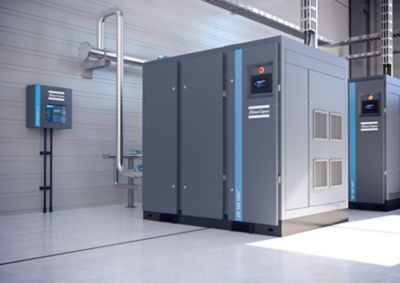Estimated reading time: 3 minutes
With these 4 tips you ensure that your compressor is as quiet as possible.
Noise is a big issue when it comes to compressors . A silent compressor can be used directly in the workplace. Noisy compressors, on the other hand, must be positioned away from the workplace using hearing protection or even in a separate room so that excessive noise pollution can be avoided.
A compressor is often not just a compressor: different types and the dimensioning of the compressor result in equally different levels of noise development. So how quiet you can actually make a compressor in the end result depends a lot on your particular model. Irrespective of this, we can give you the following tips to help you make your mission to make the compressor quieter a success.
1. Would you like to make your compressor quieter? Check the installation conditions.
The following tip may sound simple, but we know from our practice that the desire to make the compressor quieter can often be remedied with this simple trick: When compressed air is generated, vibration occurs. If the compressor is not set up correctly or is in contact with another object, the noise development can easily multiply due to resonance.
So if you want to make your compressor quieter, first check whether the installation conditions for your compressor are selected in such a way that the compressed air generator has no contact with other objects and it is standing firmly on a vibration-free surface.
2. Make compressors quieter with a sound hood:
Many of our compressors can be supplied with a sound hood, the sole purpose of which is to make the compressor run quieter. A sound hood reduces noise pollution many times over without having to invest in a new compressor. Acoustic hoods are equipped with a sound-insulating material (usually a special foam made up of several layers) and are placed over the compressor during operation so that the noise emission is dampened.
For safety reasons, we advise against using DYI sound hoods "homemade". These are often a fire hazard in the truest sense of the word and ultimately not very suitable for optimally and safely 'making the compressor quieter'. Original sound hoods are quality tested and matched to your compressor model.
3. Screw compressors are inherently quieter.
Due to their design, screw compressors are generally quieter than piston compressors. Screw compressors are the classics in all industrial applications but are also being used more and more frequently in workshops. There are many reasons for choosing a screw compressor instead of a piston compressor.
In terms of noise development, screw compressors are ahead in a direct comparison due to their design: Because of the design, there is simply less friction in the compression process. The level of compressor noise is therefore lower without the need to take any specific measures to make the air compressor quieter. However, if you are now considering purchasing a quieter screw compressor, you should bear in mind that your compressed air requirement should be at least 2 hours a day for the efficient use of a screw compressor.
So if you use your compressor regularly for this period or longer, the screw compressor is probably the better choice anyway: the energy consumption is relatively low and many energy-efficient models are subsidized by the state with up to 40%.
4. Use silent compressors or whisper compressors.
Many compressor manufacturers have silent, quiet-running or whisper-quiet compressors in their range. If your efforts to make your compressor quieter have not been sufficient, you can consider switching to such a model.
What is a silent compressor?
It should be noted that the term silent compressor. Quiet-running or whispering compressor is not particularly standardized or defined, but is freely assigned by manufacturers to indicate a rather quieter compressor model.
This means that the noise level of one silent compressor can differ greatly from that of another, or that a so-called silent compressor can ultimately be louder than a compressor that does not have the suffix 'silent' or 'whisper quiet' ' is provided.
How quiet is a silent compressor?
The volume emissions of such a silent compressor (or whisper compressor) is measured in decibels, like any other compressor. Without this information, the noise level cannot be assessed conclusively. So if you value low-noise operation, ask about the specific noise level of your compressor model before you buy it.
In addition, with most compressors, the performance and the delivery quantity of compressed air are decisive for the noise development. Larger machines not only produce more noise but above all more compressed air per unit of time. When making a comparison, as is so often the case, care must be taken to compare like with like.

